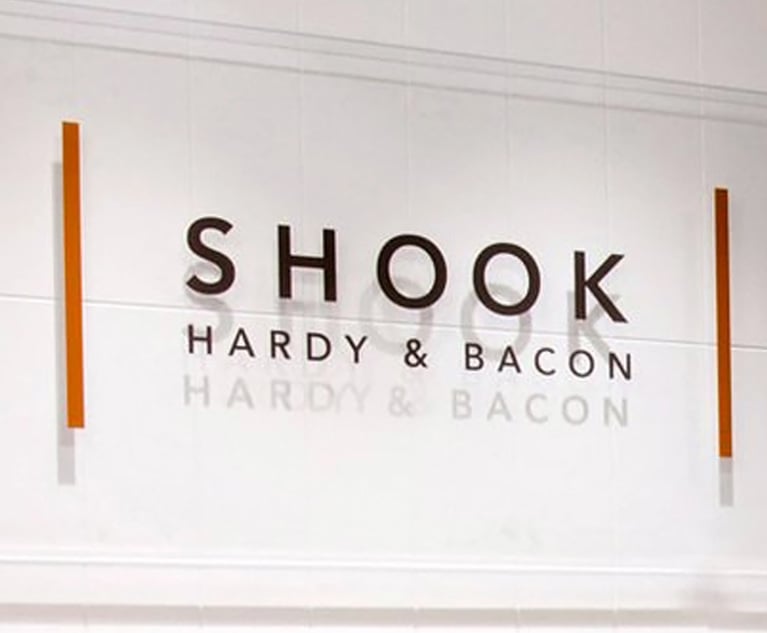Medical Diagnostics Case Faces Familiar Section 101 Hurdle
Federal Circuit judges suggested that a method of diagnosing the neuromuscular condition myasthenia gravis fails the Section 101 test.
October 05, 2018 at 03:32 PM
3 minute read
 Jonathan Singer of Fish & Richardson.
Jonathan Singer of Fish & Richardson.
The medical diagnostics industry is making one more push to protect its technology from Section 101 patent eligibility challenges, but seemed to hit a familiar brick wall Thursday at the U.S. Court of Appeals for the Federal Circuit.
Athena Diagnostics, Oxford University and the Max Planck Institute accuse the Mayo Clinic of infringing their 7,267,820 patent on a technique for diagnosing the neuromuscular disease myasthenia gravis. U.S. District Judge Indira Talwani of Massachusetts ruled the patent ineligible on the ground that Athena, a subsidiary of Quest Diagnostics Inc., had patented a law of nature.
Athena Diagnostics v. Mayo Collaborative Services arrived at the Federal Circuit on Thursday with amicus support from the Biotechnology Innovation Organization, law professors and practicing attorneys. BIO argues U.S. Supreme Court and Federal Circuit case law have created “unabated uncertainty” about the patent eligibility of biotech inventions, especially in the diagnostics area.
|
➤➤ Get IP news and commentary straight to your inbox with Scott Graham's email briefing, Skilled in the Art. Learn more and sign up here.
Fenwick & West partner Adam Gahtan told the court Talwani oversimplified the asserted patent claims, which involve using recombinant DNA technology to create fragments of a protein known as MuSK. “The specification goes into great detail about how the inventors found the binding sites on this very complex, enormous, trans-membrane protein,” Gahtan said.
Judge Alan Lourie sounded skeptical. “Counsel, these claims are awfully simple,” he told Gahtan. “It's not clear to me how they differ from the other Mayo case,” he said, referring to the Supreme Court's landmark eligibility decision Prometheus v. Mayo.
Gahtan argued that the fragments are nonnatural and must be used in a concrete, specific way. The mere presence of a natural phenomenon such as the entire MuSK protein doesn't automatically invalidate the claim, he argued.
Fish & Richardson partner Jonathan Singer argued for Mayo that the only novelty arguably present is the natural relationship between MuSK and myasthenia gravis, and that relationship can't be patented.
“This court and other courts have been through this,” Singer said. “I've been through this court arguing that the use of a non-natural material made something patentable, and that argument was rejected in the BRCA case. That simply doesn't get you over the hurdle.”
Judge Pauline Newman told Singer the plaintiffs made “a powerful point.” Their patent represents “an advance in the science over precedent. But you're saying because these are natural products, that ends it. Why would anyone do this research in that case?”
Singer pointed to Ariosa Diagnostics v. Sequenom, a Federal Circuit decision involving the discovery of fetal DNA. It was undisputed that was “a remarkable discovery,” but it still wasn't patentable, he said.
“The patent system has an incentive effect, there's no doubt about it,” Singer said. “At the same time, the Supreme Court has cautioned … we shouldn't tie up the basic tools of scientific research purely for that incentive effect.”
This content has been archived. It is available through our partners, LexisNexis® and Bloomberg Law.
To view this content, please continue to their sites.
Not a Lexis Subscriber?
Subscribe Now
Not a Bloomberg Law Subscriber?
Subscribe Now
NOT FOR REPRINT
© 2025 ALM Global, LLC, All Rights Reserved. Request academic re-use from www.copyright.com. All other uses, submit a request to [email protected]. For more information visit Asset & Logo Licensing.
You Might Like
View All

Meet the Long Island Judge Tapped to Be US Attorney for Eastern District of New York
3 minute read
Appeals Court Rejects Trump Attempt to Delay Friday Sentencing
Trending Stories
- 1Courts, Lawyers Press On With Business as SoCal Wildfires Rage
- 2Florida, a Political Epicenter, Is the Site of Brownstein Hyatt's 13th Office
- 3Law Firms Close Southern California Offices Amid Devastating Wildfires
- 4Lawsuit alleges racial and gender discrimination led to an Air Force contractor's death at California airfield
- 5Holland & Knight Picks Up 8 Private Wealth Lawyers in Los Angeles
Who Got The Work
Michael G. Bongiorno, Andrew Scott Dulberg and Elizabeth E. Driscoll from Wilmer Cutler Pickering Hale and Dorr have stepped in to represent Symbotic Inc., an A.I.-enabled technology platform that focuses on increasing supply chain efficiency, and other defendants in a pending shareholder derivative lawsuit. The case, filed Oct. 2 in Massachusetts District Court by the Brown Law Firm on behalf of Stephen Austen, accuses certain officers and directors of misleading investors in regard to Symbotic's potential for margin growth by failing to disclose that the company was not equipped to timely deploy its systems or manage expenses through project delays. The case, assigned to U.S. District Judge Nathaniel M. Gorton, is 1:24-cv-12522, Austen v. Cohen et al.
Who Got The Work
Edmund Polubinski and Marie Killmond of Davis Polk & Wardwell have entered appearances for data platform software development company MongoDB and other defendants in a pending shareholder derivative lawsuit. The action, filed Oct. 7 in New York Southern District Court by the Brown Law Firm, accuses the company's directors and/or officers of falsely expressing confidence in the company’s restructuring of its sales incentive plan and downplaying the severity of decreases in its upfront commitments. The case is 1:24-cv-07594, Roy v. Ittycheria et al.
Who Got The Work
Amy O. Bruchs and Kurt F. Ellison of Michael Best & Friedrich have entered appearances for Epic Systems Corp. in a pending employment discrimination lawsuit. The suit was filed Sept. 7 in Wisconsin Western District Court by Levine Eisberner LLC and Siri & Glimstad on behalf of a project manager who claims that he was wrongfully terminated after applying for a religious exemption to the defendant's COVID-19 vaccine mandate. The case, assigned to U.S. Magistrate Judge Anita Marie Boor, is 3:24-cv-00630, Secker, Nathan v. Epic Systems Corporation.
Who Got The Work
David X. Sullivan, Thomas J. Finn and Gregory A. Hall from McCarter & English have entered appearances for Sunrun Installation Services in a pending civil rights lawsuit. The complaint was filed Sept. 4 in Connecticut District Court by attorney Robert M. Berke on behalf of former employee George Edward Steins, who was arrested and charged with employing an unregistered home improvement salesperson. The complaint alleges that had Sunrun informed the Connecticut Department of Consumer Protection that the plaintiff's employment had ended in 2017 and that he no longer held Sunrun's home improvement contractor license, he would not have been hit with charges, which were dismissed in May 2024. The case, assigned to U.S. District Judge Jeffrey A. Meyer, is 3:24-cv-01423, Steins v. Sunrun, Inc. et al.
Who Got The Work
Greenberg Traurig shareholder Joshua L. Raskin has entered an appearance for boohoo.com UK Ltd. in a pending patent infringement lawsuit. The suit, filed Sept. 3 in Texas Eastern District Court by Rozier Hardt McDonough on behalf of Alto Dynamics, asserts five patents related to an online shopping platform. The case, assigned to U.S. District Judge Rodney Gilstrap, is 2:24-cv-00719, Alto Dynamics, LLC v. boohoo.com UK Limited.
Featured Firms
Law Offices of Gary Martin Hays & Associates, P.C.
(470) 294-1674
Law Offices of Mark E. Salomone
(857) 444-6468
Smith & Hassler
(713) 739-1250









